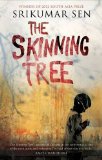 Winner of the 2012 Tibor Jones South Asia Prize
Winner of the 2012 Tibor Jones South Asia Prize
Five words from the blurb: India, boy, school, tragedy, regime
The Skinning Tree is set in India during the 1940s. It tells the story of nine-year-old Sabby, a boy who is sent to a boarding school in Northern India. Being away from Calcutta is meant to protect him from advancing Japanese troops, but life away from home is hard as the teachers are strict and abusive. The boys take their frustrations out on animals; killing them and hanging their skins out to dry. The book does a fantastic job of showing how British culture has influenced Indian life, but I found many sections of the book a bit flat and lifeless.
The Skinning Tree was a strange reading experience. It contained two writing styles; so different they could almost to be written by two separate people. Some sections were beautifully written, with atmospheric descriptions that compelled the reader to continue. The opening paragraph, for example, was fantastic:
Murder was the plaything of us kids. We fooled with the idea of killing like some kids fool with fire. We stood around in free time on the far side of the pitch, leaning against the wall or sitting on it, kicking our boot heels against it, talking — talking about killing, killing someone, someone we didn’t like, how we would do it: killing was easy, no one would tell on you, because they wouldn’t. Talking and bragging. Then one day it happened. Sister Man was found on the rocks below the school.
But then other parts seemed very poorly written. The dialogue was especially clunky and the repetition of “said Sabby” drove me nuts! I found that the sections written in the first person were generally well done, but the third person narrative didn’t work. It was weird, distant and read like the simple books children have when they first learn to read. Things improved as the book progressed, but the wonderful final chapter only seemed to reinforce my thoughts about what had been lacking at other moments.
The title and description of this book may make some people wary, but the scenes of violence aren’t particularly graphic and should be tolerated by all but the most sensitive reader.
Overall this was an odd book. I recommend it to people who are interested in studying different styles of writing!

.
The thoughts of other bloggers:
…life changing and unforgettable. Julia’s Blog
…occasionally the narration is jarring and confusing Moni’s Nook
….it was the 81 year old author’s evocative descriptions of an Anglicised Indian life, of afternoon whist parties, of lengthy train journeys that will long remain with me. Pen and Paper

4 replies on “The Skinning Tree by Srikumar Sen”
Sounds interesting and I do quite fancy it, but I’m not sure I’ll be rushing out to get a copy. The comment about the different writing styles is intriguing: I vaguely recall you saying you weren’t a fan of Roma Tearne (I might be wrong there!) but her first book ‘Mosquito’ was a bit like that: for the most part beautiful poetic writing, but then there were these “action” bits where she slipped into a bog standard thriller style (your reference to children’s books is spot on) that completely wrenched me out of the story and made me really aware of the author writing (a bit like when you can see actors acting – you shouldn’t be able to).
David, You’re right – I’m not a big fan of Roma Tearne and there are a lot of similarities in the writing styles of the two authors. I actually think the good writing makes the poor writing seem so much worse. I can get used to bad writing if I’m reading a fast-paced thriller as the action distracts you, but when you put it next to some beautiful descriptions it stands out like a sore-thumb. Exactly like spotting that an actor is acting!
I admit I was a little wary when I accepted this one, I guessed it could be a hard read but at the same time the context was appealing. I haven’t read it yet, but what you’ve said sounds a look like what I’m expecting, content-wise.
Charlie, I look forward to comparing notes on it.